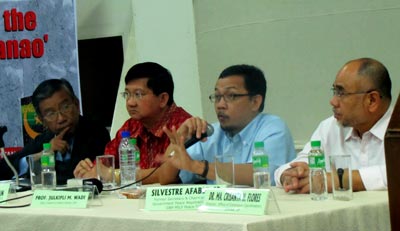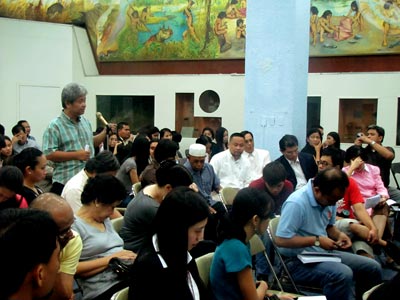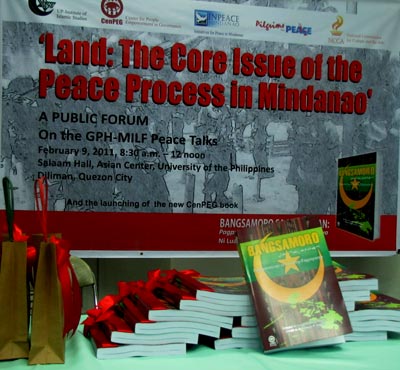Thorny issues in GPH-MILF peace talks raised in public forum
Posted by CenPEG
February 9, 2011
Contentious issues face the peace process between the Government of the Philippines (GPH) and the Moro Islamic Liberation Front (MILF) as exploratory talks resumed February 9 in Kuala Lumpur, Malaysia.
These contentious issues and obstacles came up during a public forum held at the Bulwagang Salam, Asian Center, University of the Philippines, Diliman, Quezon City. Organized by CenPEG, the UP Institute for Islamic Studies (IIS), and three other organizations, the forum coincided with the resumption of exploratory talks between the GPH and MILF toward the forging of a final peace agreement.
The public forum was also marked by the launching of CenPEG’s latest book, Bangsamoro sa Malapitan: Pagpupunyagi sa Sariling Pagpapasya (Bangsamoro Up Close: Struggle for Self-Determination). The book is written by CenPEG Fellow, Lualhati M. Abreu.
In his opening remarks, CenPEG Fellow, Prof. Roland Simbulan, noted that peace negotiation “is no easy task” and, after having failed particularly in talks with the MILF, “the next big step is to make it work.” Toward this end, he said, the peace process under President Benigno S. Aquino III, should work for new approaches.
Prof. Julkipli Wadi, dean of the IIS, said 37 years of peace talks (with both the MILF and, earlier, the Moro National Liberation Front or MNLF) have seen “unstable shifting sands.” The core issue of land for the Muslims, he said, should be decisively addressed to correct the injustice of making them “squatters” in their own land. The Autonomous Region of Muslim Mindanao (ARMM) and so-called development agencies have long been established yet the region remains the poorest in the country, the IIS dean added.
The failure of the government to make development a reality in the Bangsamoro homeland, Wadi said, only indicates a failed state that remains incapable of addressing the issues of poverty not only in the ARMM but the whole country as well.
In his talk, Silvestre Afable, Jr., former Secretary and chair of the GRP peace negotiating panel (2003-2007), gave a run-through of the issues of the negotiation, including self-determination, ancestral domain, respect for the dignity of rebels, territory, development and security aspects.
Afable said there had been policy differences within the government itself, including whether to treat the peace talks with the MILF as a security issue on terrorism. He said that he never believed the MILF was a “terrorist” group. The former secretary also admitted that unless the issues are addressed decisively by government, the Moro people have the right to “independence.”
Gen. (ret.) Rodolfo C. Garcia, who chaired the GRP panel in 2007-2008, lamented the “tragedy” over the proposed Memorandum of Agreement – Ancestral Domain (MoA-AD) which was to be forged in 2008 with the MILF until it was abandoned in the ensuing violent reactions in many Mindanao provinces and a subsequent Supreme Court (SC) ruling on its unconstitutionality.
Garcia, who spoke on learning lessons of the Mindanao peace process, noted that for a government to be able to pursue peace negotiations the presidency should enjoy a high public trust rating, practice “clarity of language,” and wage effective public information.
Simbulan, in addition, noted the presence of U.S. forces in Mindanao which is a major obstacle to the attainment of peace on the island.
At the open forum, Wadi said that whatever prospective peace agreement may be reached, particularly on the concept of “sub-state” will still have to undergo a constitutional amendment especially if it will result in a federation.
In his synthesis, Bobby Tuazon, CenPEG’s Director for Policy Studies, underscored the importance of both panels’ putting their acts together in the ongoing peace process. He mentioned, for instance, the presence of policy differences over the Moro peace talks within the government while, on the other hand, the MILF is beset by internal disagreement with a splinter group led by Ameril Umbra Kato.
The Feb. 9 forum is the first of a series of educational activities lined up between CenPEG and UP IIS on Bangsamoro studies in 2011. Co-sponsoring the forum were the Pilgrims for Peace, InPeace Mindanao, and the National Commission on Culture and the Arts (NCCA).
Attended by close to 150 people, the forum was also graced by the presence of representatives of different embassies including Malaysia and Indonesia, as well as the academe, students, Muslim community, interfaith, issue-based organizations, and foreign and local media.
Members of the MILF peace panel, who had earlier agreed to speak at the forum, did not attend due to the resumption of peace talks in Kuala Lumpur on the same day. CenPEG Reports

Dean Julkipli Wadi (second from right) responds to question at open forum while Gen. (ret.) Rodolfo Garcia, CenPEG Fellow Prof. Roland Simbulan, and former Secretary Silvestre Afable, Jr. listen. (CenPEG Photo)

Part of the forum participants. (CenPEG Photo)

Part 2: Book Launch of Bangsamoro sa Malapitan. (CenPEG Photo) Click here to read the Bangsamoro sa Malapitan Book Review
- Probing presidential platforms
- Conference calls for people-centered policy actions for Asian development and peace
- WWII 'comfort women' urge visiting Japanese emperor: OFFICIAL GOV’T APOLOGY, UPHOLD TRUTH, and JUST COMPENSATION
- FEARLESS FORECAST (EPISODE II): Comelec will not comply with e-Commerce Law in 2016 elections
- Fearless forecast: Comelec’s non-compliance with the AES law in 2016 (last of 2 parts)
- Fearless forecast: Comelec will not comply with the AES law in 2016
- CenPEG releases travelogue
- Experts: Nuisance bets reflect disillusionment, uneven playing field
- Partylist solon presses for tax cuts
- The True Cost of a Political Campaign
- Management decisions: Based on RA 9369 or purely Comelec’s?
- CenPEG holds 1st roundtable with media on presidential poll results
- Filipino IT can do it!
- FIT4E: The only transparent solution
- Realpolitik in the maritime tiff
- China’s challenge to PH sovereignty
- Choosing the next president
- Fixing the presidency, reforming the state
- New Comelec chair says he’s open to other election technologies
- SC ruling on AES Watch Pabillo and IBP vs Comelec, Smartmatic-TIM
- Comelec must explain P3.2B unliquidated cash advances
- CONGRESS ASKED TO HOLD DEMO ON PCOS HACKING
- 25 Bishops ask poll body to stop midnight deal with Smartmatic
- Pope Francis: reform and conversion
- 2 poll watch coalitions stage rally vs Comelec-Smartmatic midnight deal
- AES Watch questions Comelec-Smartmatic midnight deal
- ASEAN-India: Building Youth Partnerships through Culture and Entrepreneurship
- CenPEG forges research exchange and partnership with Jinan University
- FOI: Bearing fruit or foiled again?
- Remittance with Representation: The right to vote of overseas Filipinos
Center for People Empowewrment in Governance (CenPEG), Philippines. All rights reserved


